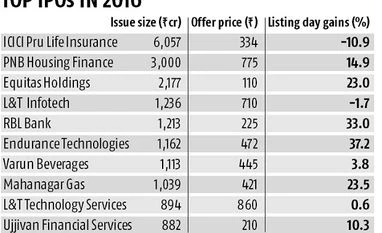The current turbulence in the market threatens to choke the flow of upcoming initial public offerings (IPOs) of equity and derail possible strategic stake sales by the government in the coming weeks.
The benchmark BSE Sensex has slid about 5% since November 8, following the Trump win in America and demonetisation of high-value currency. During this period, foreign portfolio investors have sold shares worth $1 billion.
Investment bankers say if the situation does not improve in the next week or so, IPOs might get deferred. “Roadshows for four or five are on and their timeline is likely to get impacted if the situation deteriorates,” said an investment banker of a top domestic firm, requesting anonymity. “If shares of listed firms start falling, why would investors want to bet on new names with no track record?”
Approval of seven IPOs worth Rs 2,500 crore might lapse in the next three months if they don't hit the market, data show. Timelines of other big-ticket IPOs gearing up to hit the market could also get impacted, said experts. Warburg Pincus-backed generic drug maker Laurus Labs (estimated issue amount of Rs 1,000 crore) and Sheela Foam (Rs 510 crore) reportedly aimed to hit the market with their offerings by November-end. IPOs worth Rs 24,500 crore have hit the market in 2016.
“I don’t think any banker or company would like to open an IPO at this time. Banks are choked with the work of depositing and withdrawing cash and operationalising the Asba (applications supported by blocked amount) system might become difficult,” said Prithvi Haldea, founder, Prime Database. In Asba, an IPO applicant's account doesn't get debited until shares are allotted. Pricing the offerings might also be a problem. “If the market tanks, investors will want a lower price, which promoters might not be comfortable with,” said Dara J Kalyaniwala, vice-president at PL Capital Markets.
More From This Section
The volatility might upset the government’s divestment plan. For the current financial year, it's target is Rs 56,500 crore, of which it has managed Rs 21,400 crore. Earlier this month, the government offloaded 1.6% in Larsen & Toubro, held through Specified Undertaking of the Unit Trust of India (Suuti).
Current norms prevent further stake sale in L&T for the next six months. So, the government is likely to target sales in Axis Bank or ITC. However, in the past month, shares of Axis and ITC have slid 8.5% and 3.4%, respectively.
Haldea believes the government should not try to time its exit. “We are talking of solid stocks here. The government has to show greater intent and follow through with the (Suuti) share sale, rather than wait for the ‘right’ market conditions,” he said.
Late October, the Cabinet gave in-principle approval for strategic sale and divesting management control in over two dozen public sector units.
)